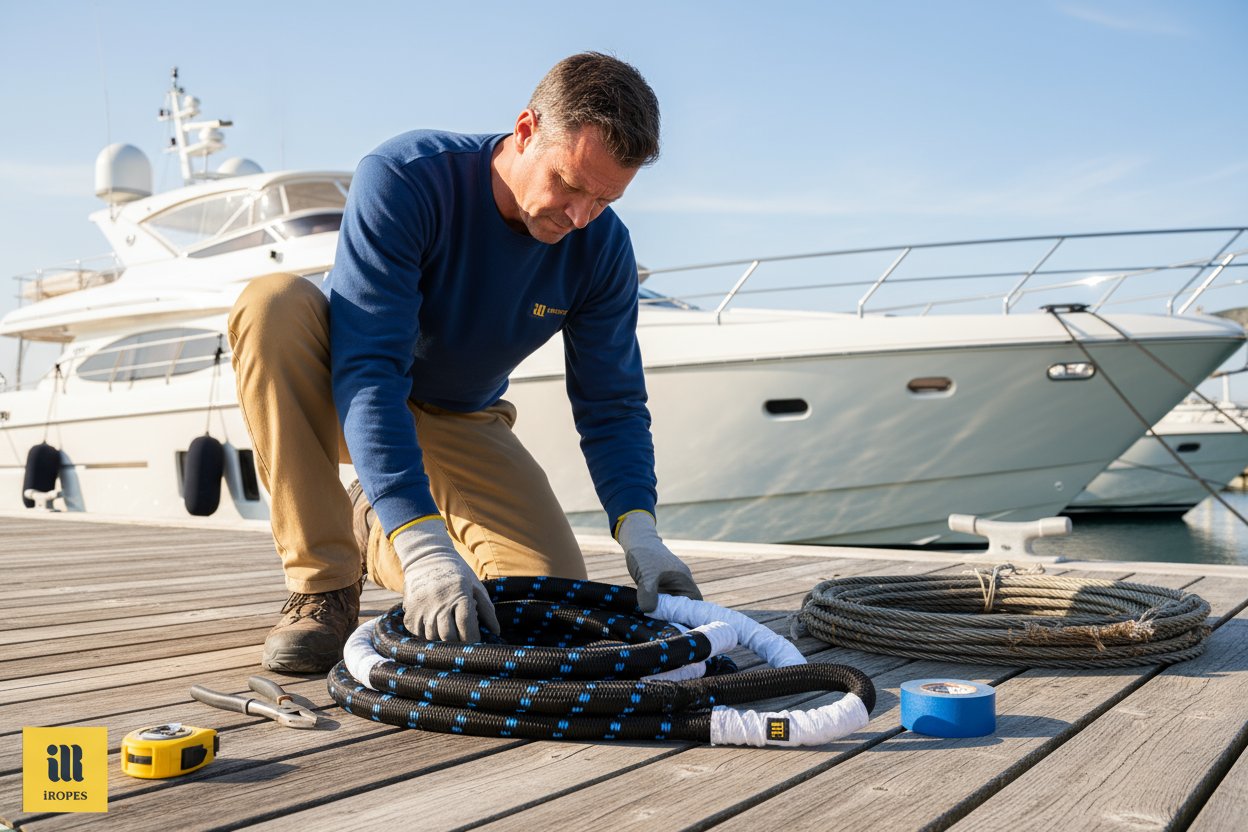Wire ropes damage 70% of luxury yacht lifts by scratching gel coats that cost $5,000+ to repair—iRopes' soft slings prevent this entirely with non-marring nylon or polyester materials, ensuring flawless finishes in marina operations.
Unlock These Benefits for Safer Yacht Handling (8-Min Read)
- ✓ Shield delicate gel coats from abrasions, potentially cutting repair costs by 90% compared to rigid wire ropes in high-end lifts.
- ✓ Gain up to 40% stretch in nylon slings for shock absorption on irregular yacht shapes, improving safety and conformity during handling.
- ✓ Choose polyester options with under 7% elongation for UV-resistant durability in marine environments, potentially lasting twice as long outdoors.
- ✓ Access iRopes' OEM customisation for branded, tailored straps that fit your rigging needs precisely, boosting operational efficiency.
You've always thought heavier-duty wire ropes offered unbeatable strength for yacht lifts. Yet, they can silently gouge those multimillion-dollar finishes, leaving you with unexpected repair bills and downtime. What if a seemingly softer alternative delivered superior protection without sacrificing load capacity? iRopes reveals how their innovative soft slings transform risky operations into seamless, damage-free routines. However, choosing the right material and configuration for your marina's unique demands is crucial for optimal protection.
Understanding Soft Slings: A Gentle Alternative for Delicate Lifts
Imagine the frustration of watching a pristine luxury yacht get marred during a routine lift, simply because the equipment dug in too much. As we mentioned, traditional wire ropes can turn a straightforward operation into an expensive headache. This is precisely where soft slings come into play as an innovative solution. These aren't just any lifting tools; they are thoughtfully designed to handle heavy loads without leaving a trace.
Essentially, soft slings are synthetic lifting solutions made primarily from materials such as nylon and polyester. Think of them as wide, flexible straps or loops that wrap around loads with a gentle, cushioned touch. Unlike metal chains or wire ropes, which are stiff and prone to scratching, these slings feature smooth, non-marring surfaces. They are engineered for contact with sensitive items, distributing weight evenly to avoid pressure points that could damage fragile finishes. Nylon, for example, offers a degree of elasticity, absorbing shocks effectively. Polyester, while firmer, remains soft to the touch and resists wear in challenging conditions.
So, why do these matter so much in luxury yacht handling? Yachts are more than just vessels; they are often considered works of art with gleaming gel coats and custom paint jobs that can cost a fortune to repair. A single scratch from a rigid wire rope during lifting or transport can mean hours of meticulous buffing or repainting, alongside significant downtime. Soft slings eliminate this risk by cushioning the contact, preventing digs and abrasions. Crews at high-end marinas can operate with greater confidence, knowing their equipment won't compromise those pristine surfaces. It's akin to wrapping your most prized possession in a protective blanket while still being able to lift it effortlessly.

What are soft slings used for, exactly? They are versatile workhorses, excelling in situations where delicate handling meets substantial strength. In marine operations, such as hoisting yacht components or securing hulls for transport, they are invaluable for safeguarding high-value finishes. Moreover, their utility extends to other sectors. Consider automotive manufacturing, where painted car bodies require lifting without blemish, or aerospace facilities maneuvering fragile composite parts. Soft slings are fundamental in these environments, adapting to irregular shapes and precision-demanding tasks. They are not limited to one industry; rather, they are the preferred choice for any lifting scenario where the load's appearance is as critical as its weight.
These gentle alternatives demonstrate that you do not need to choose between safety and surface protection. Moving forward, exploring the specific types—like nylon versus polyester—will illustrate just how tailored these solutions can be for your particular lifting requirements.
Exploring Types of Lifting Sling Straps: Nylon, Polyester, and Beyond
Building on the foundation of gentle, reliable lifting, let's now delve into the specifics of what makes certain lifting sling straps truly exceptional. Nylon and polyester remain primary materials for soft slings, each offering unique characteristics that prove vital when handling challenging loads, such as the curved yacht parts we previously discussed.
Nylon web slings are notably adaptable, providing sufficient flex and stretch to absorb unexpected jolts without transmitting them to your load. Imagine wrapping a nylon sling around an irregular yacht mast or a bulky engine component. Its elasticity—often up to 40% stretch under load—allows it to conform smoothly, significantly reducing the risk of slips or uneven pressure. These flat or tubular web slings come in various configurations, ensuring secure handling whether you are dealing with sharp angles or require a sling that moulds to complex shapes in a busy marina.
In contrast, polyester round slings offer more steadfast performance, sacrificing some stretch for enhanced durability in harsher environments. With minimal elongation—typically under 7%—they maintain stability, making them ideal for marine environments where constant UV exposure and chemical splashes could degrade other materials. Their endless loop design, enclosed within a robust yet soft jacket, cradles loads securely without causing damage. This makes them perfect for hoisting sleek hull sections that demand precision and resistance against environmental elements.
Nylon Web Slings
High flexibility with up to 40% stretch for shock absorption; vulnerable to acids but excellent for dynamic loads.
Configurations
Eye-and-eye for straight lifts; endless loops for versatility in choker or basket hitches.
Polyester Round Slings
Low stretch under 7%, excellent UV and chemical resistance; stronger against bases but less elastic.
Configurations
Endless for multi-use; eye loops for targeted rigging in wet, exposed environments.
So, what's the fundamental difference between nylon and polyester lifting slings? Nylon excels where you need forgiving elasticity to cushion impacts, though it is susceptible to weakening from acids commonly found in cleaning agents. Polyester, conversely, maintains its shape better in direct sunlight or when exposed to alkaline spills, but it does not rebound from shocks with the same elasticity. Regarding types of lifting sling straps, they generally include web styles like flat eye-and-eye for direct attachment, or endless for looping around loads, alongside round variants that offer all-around protection. When considering saltwater lifts, polyester often proves superior due to its enhanced resilience.
Naturally, not all straps compare equally against wire rope slings. While metal options provide immense strength for extreme weights, their rigid, abrasive nature poses significant risks in sensitive applications, such as scratching a yacht's glossy finish during a hoist. Soft alternatives completely bypass this issue, ensuring operations are smooth and surfaces remain intact without adding extra weight that can fatigue your team.

Understanding these distinct options is critical for appreciating how they safeguard precious yacht finishes in real-world applications.
Advantages of Industrial Lifting Straps in Protecting Luxury Yacht Finishes
Now that we've covered the key types of lifting sling straps, it's time to delve into their specific advantages, particularly how they shield luxury yachts from damage during critical lifts. These industrial lifting straps are more than just tools; they represent a strategic choice for anyone involved in high-stakes operations where every scratch makes a difference.
One primary benefit lies in load protection, especially when handling the flawless gel coats and painted surfaces that characterise luxury yachts. While traditional gear might inadvertently damage the finish, leading to costly touch-ups, these straps act as a soft barrier, cushioning against abrasions from the outset. In a busy marina, where lifts occur daily under tight deadlines, this translates to avoiding unexpected dings that could sideline a vessel for extended periods. I recall discussions with a yacht technician who became a strong advocate for these slings after a near-miss with a harsher alternative; his team's efficiency notably improved as they no longer constantly worried about post-lift repairs.
Furthermore, the flexibility of industrial lifting straps allows them to conform to the unique contours of yacht hulls or masts without creating awkward angles. They naturally adapt to curved shapes, distributing weight evenly so no single point bears excessive stress. Being lightweight—often a fraction of their metal counterparts—makes them easier for crews to handle, reducing fatigue and slip risks during long shifts on the water. This seemingly simple change significantly enhances overall safety without overcomplicating the task.
Choosing the correct lifting sling for your application can initially seem daunting, but it often comes down to a few critical factors relevant to yacht rigging. Consider the load type: delicate finishes necessitate soft synthetics over any rigid material. Evaluate the environment as well; saltwater exposure calls for materials with robust chemical resistance. Then, there are hitch configurations, such as basket hitches for stable horizontal lifts or choker hitches for more secure grips around components. Ensuring these factors are appropriately matched guarantees your setup handles the specific demands of marine work without compromise.
- Load Type - Assess if the load is fragile, such as a painted hull; opt for non-marring synthetic materials to prevent surface damage.
- Environment - Consider factors like moisture or UV exposure; polyester typically performs better in sunny, wet marinas than nylon.
- Hitch Configurations - Select vertical for direct pulls, basket for balanced support, or choker for secure wraps on irregular yacht parts.
When comparing industrial lifting straps to traditional wire rope, the discrepancy in damage risk is immediately apparent. For a deeper dive into why fiber rope outperforms wire rope slings, especially in protecting sensitive yacht finishes, the advantages are clear. Wire rope's inherent stiffness can gouge finishes if not perfectly padded. However, soft slings minimise this threat by design, often paired with chafe guards for superior protection around edges. Techniques like adding protective sleeves become straightforward, allowing you to focus on the lift itself rather than potential repairs. It's not about sacrificing strength; it's about smarter protection that ensures your yachts remain in showroom-ready condition after every manoeuvre.
These advantages in safeguarding and ease of use make a significant difference, but imagine enhancing this further with options precisely tailored to your unique setup.

Customising and Maintaining Soft Slings for Optimal Yacht Performance
With these compelling advantages in mind, particularly for marine applications, discover how iRopes' customisation services can tailor industrial lifting straps precisely to your yacht handling requirements. When confronting the unique curves and delicate finishes of a luxury yacht, off-the-shelf equipment may not suffice. This is where our OEM and ODM expertise becomes invaluable; we collaborate closely with you to craft soft slings that provide a perfect fit, ensuring every lift supports your operations seamlessly.
Customisation begins with selecting the appropriate foundational elements to meet your yacht's specific demands. We can adjust dimensions, such as widths ranging from 2 to 12 inches or lengths up to 100 feet, allowing the sling to wrap securely around hulls or masts without unnecessary bulk. Material choices enable you to select between nylon for its forgiving flexibility in dynamic marina operations or polyester for its resistance against saltwater spray. End fittings, including reinforced eyes or hardware like thimbles, are designed for seamless rigging. Additionally, branding options can incorporate your logo directly into the fabric for a professional finish. The objective is to create a tool that feels custom-built, thereby enhancing efficiency in your daily routines.
Core Custom Elements
Tailored for Yacht Needs
Materials
Nylon for shock absorption or polyester for UV durability in sunny marinas, catering to specific environmental needs.
Dimensions
Custom widths and lengths to handle specific hull sizes without undue strain or bulk.
End Fittings
Loops or thimbles designed for secure, non-slip connections at critical rigging points.
Added Personalisation
Branding and More
Colour and Patterns
Match your fleet's aesthetic or integrate capacity colour-coding for rapid identification.
Branding
Incorporate your logos or labels to reinforce your marina's identity on every lift.
Packaging
Options such as branded bags or cartons are available for convenient storage and worldwide shipping to your facility.
Once your customised soft slings are in hand, maintaining them in optimal condition is crucial for their longevity. Consider this analogous to routine check-ups that prevent significant issues later on. Every sling from iRopes adheres to ISO 9001 quality assurance standards, aligning with OSHA guidelines and relevant marine safety standards. Regular inspections effectively detect issues early, and proper storage extends their lifespan, ensuring they are always ready for the next yacht haul.
To inspect lifting straps for damage, begin with a thorough visual check before each use, then conduct a more detailed examination as needed. Look closely for cuts, frays, or discolouration that could indicate wear from saltwater exposure or friction. Feel for any unusual stiffness or thinning, which might signal that chemical exposure or overloading has compromised the fibres. OSHA recommends documenting these checks, and any sling that has reached approximately 80% of its breaking strength or shows signs of heat damage from friction should be retired. Store them coiled loosely in a dry, shaded area away from direct sunlight to prevent UV degradation; hanging them in a marina shed is an effective method. If a sharp propeller edge is a concern, apply corner protectors or sleeves during lifts to shield the material. After exposure to salty environments, rinse off any salt buildup with fresh water to mitigate environmental factors.
- Visual Check - Scan for cuts, abrasions, or faded colours indicating UV wear.
- Tactile Inspection - Feel for soft spots or hardened areas resulting from chemical contact.
- Tag Review - Verify that load limits have not been exceeded in previous uses.
- Environmental Clean - Rinse residues thoroughly to prevent performance degradation in wet settings.
By diligently following these steps, your equipment will remain reliable, thereby minimising risks during critical marina operations.

As we conclude our discussion on customisation and maintenance essentials, it is evident that soft slings offer unparalleled protection. Now, let’s summarise and explore how partnering with iRopes can address your specific needs. For specialized solutions in yachting applications, our range of high-performance ropes ensures seamless integration with soft slings.
Soft slings emerge as the optimal cushioned lifting solutions for luxury yacht handling, effectively safeguarding delicate marine finishes from the scratches and abrasions that traditional wire ropes often inflict during sensitive lifts. Unlike rigid wire ropes, synthetic materials such as nylon and polyester provide non-marring contact, conforming flexibly to curved hulls and gel coats without creating pressure points. In high-end marina operations, lifting sling straps excel by distributing weight evenly, enhancing worker safety through their lightweight design, and incorporating proper padding techniques, such as chafe guards, for added protection against sharp edges.
From nylon's shock absorption to polyester's UV resistance, these industrial lifting straps offer tailored advantages over conventional options, ensuring pristine painted surfaces and efficient rigging. With iRopes' comprehensive OEM customisation services, you can optimise these slings for your specific requirements, maintaining them through routine inspections to prolong their performance and ensure compliance with safety standards.
Ready to Protect Your Yachts with Custom Soft Slings?
If you wish to explore personalised recommendations for your marine operations, the inquiry form above connects you directly with iRopes experts, who can provide tailored advice on soft slings and lifting solutions.























